LONDON: Under the searing desert sun, where the wind kicks up sand and the silence is broken by the murmurs of hunger, tens of thousands of people have gathered in makeshift camps with nothing but bundles of belongings, tired donkeys and empty water containers.
These are the lucky ones, the survivors of an assault on the Zamzam and Abu Shouk displacement camps in Sudan’s North Darfur on April 11 by armed groups reportedly affiliated with the paramilitary Rapid Support Forces.

At least 100 people were reported killed during that single day of violence at the camps and the nearby city of Al-Fasher, the capital of North Darfur. Among the dead were at least 20 children and nine humanitarian aid workers.
Thousands more fled, carrying what little they could manage: bundles of clothing, jerry cans, and the names of family members they could not find amid the mayhem.
The RSF said the camps in question were being used as bases by what it called “mercenary factions.” It also denied targeting civilians and accused its rivals of orchestrating a media campaign, using actors and staged scenes within the camp to falsely incriminate it.
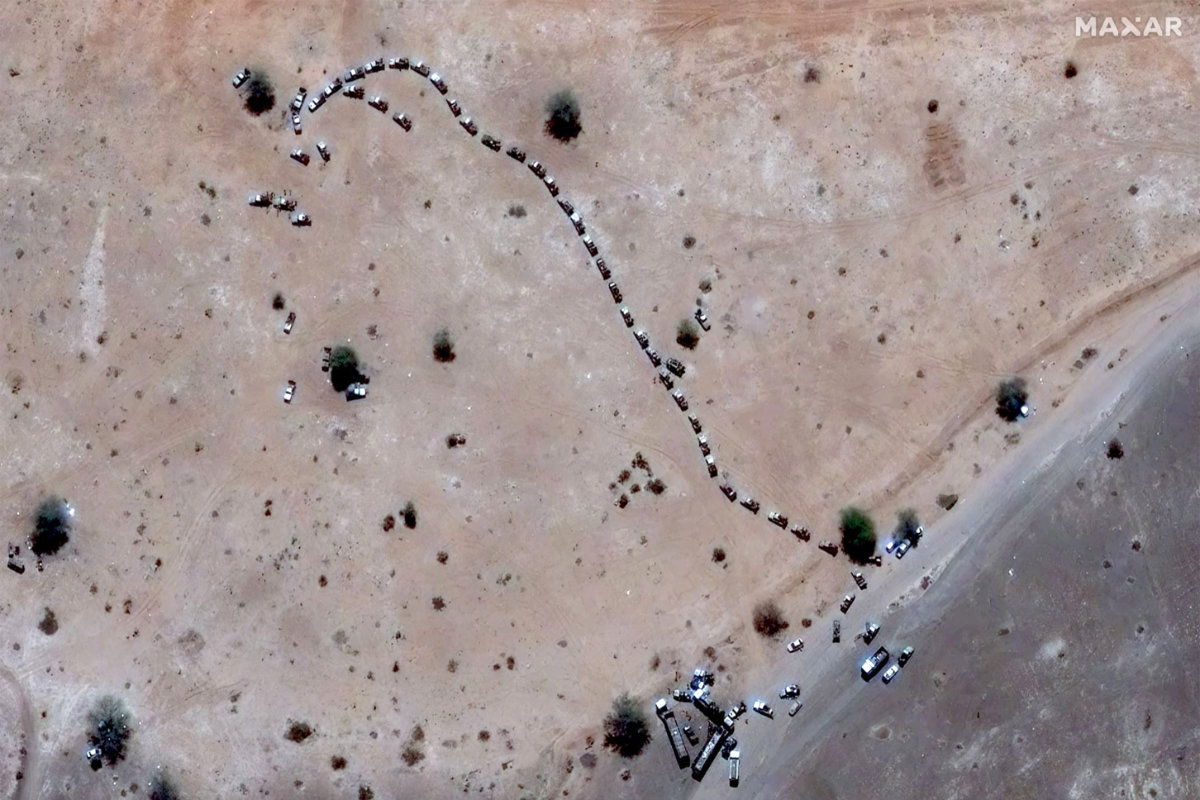
This handout image courtesy of Maxar Technologies taken on April 16, 2025 shows weapon-mounted technical vehicles on the eastern border of Zamzam camp near the besieged Darfur city of El-Fasher. (Maxar Technologies via AFP)
One of the few doctors still working in Al-Fasher, Dr. Yasser Mohammed, witnessed the horrors from inside.
“The attack began from three directions,” he told Arab News. “The casualties were mostly civilians. I saw children, elders, students of Quranic schools, and even our medical staff shot. The numbers are too many. I can’t count.”
Many of the survivors have gathered in Tawila, a locality 70 kilometers away that was already struggling with limited resources. More than 120,000 people have arrived there in a matter of days. Local leaders say the area is suffering from acute shortages of drinking water and medicine. Several displaced people have died of heatstroke or thirst.
IN NUMBERS
• 13.6 million People forcibly displaced by the Sudan war, which began on April 15, 2023.
• 700,000 Displaced people living in Zamzam and Abu Shouk camps in North Darfur.
A video shared by local humanitarian volunteers showed a woman fainting after going three days without food or water. Many people arrived already malnourished, having lived in famine-like conditions for nearly eight months, with a siege crippling food supplies and basic services.
The crisis is only the latest chapter in a war that has torn Sudan apart since April 2023, when a power struggle between rival military commanders plunged the country into a brutal internal conflict.
Fighting has devastated major cities and destroyed vital infrastructure, displacing more than 13.6 million people — the largest displacement crisis on the planet.
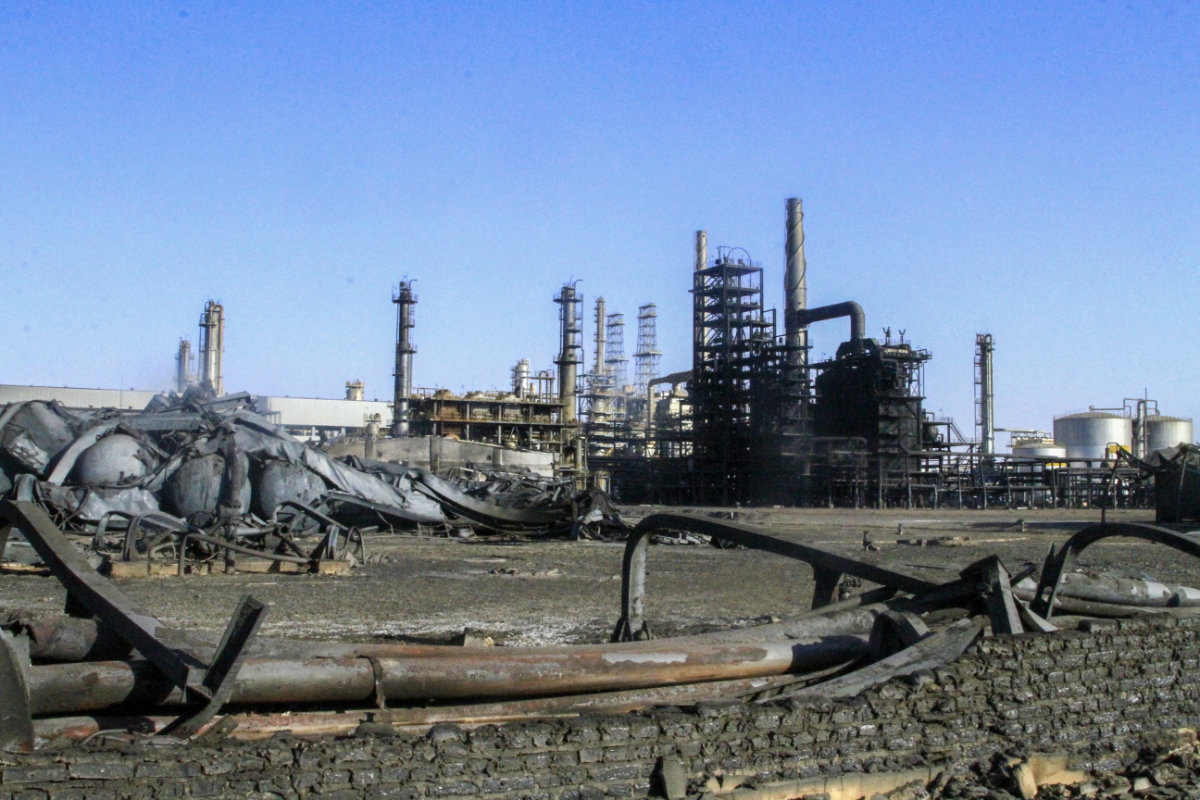
This picture shows the burnt and heavily damaged facilities of the Jaili Oil Refinery, Sudan's largest, north of the capital Khartoum on March 18, 2025. (AFP)
The recent recapture by the Sudanese Armed Forces of the capital, Khartoum, from the RSF has intensified violence in other regions, especially Darfur, where civilians have long been targeted.
Al-Fasher is a city in a state of crisis. “Water is nearly gone. Fuel is nearly gone. And the desert heat is relentless,” Ramadan Djabir Nahar Awadallah, an aid worker based in Dabbah, told Arab News.
“Nearly half a million people are now living in one neighborhood, Hayy Al-Jami’a, near the airport.”
Al-Fasher, like much of North Darfur, has been functionally cut off for months. Aid workers say what little water makes it through on trucks is shared among hundreds of families.

This picture taken on September 1, 2023 shows a view of destruction in a livestock market area in al-Fasher, the capital of Sudan's North Darfur state. (AFP/File)
“We try to provide water,” said Awadallah. “But it is limited and may run out soon. Al-Fasher has become a city of shadows; people move but they are not really living; they are surviving.”
The burden is visible in photos taken on the ground: families squatting in open fields under the sun; boys herding donkeys between heaps of kindling; girls clutching empty pots. No proper tents, no sanitation, no roads. Just earth, exhaustion and silence.
“This is yet another disaster for families in Sudan who have faced two years of conflict that have caused the world’s largest displacement crisis,” said Francesco Lanino, deputy country director for Save the Children Sudan.
“There is dire need for urgent food distributions, including ready-to-eat meals and nutritional support to curb malnutrition. Provision of shelter and other non-food items is paramount for the new arrivals who are sheltering in schools in open spaces.
“Additionally, there is an urgent need to support or establish mobile health clinics and ensure the availability of essential medicines, first aid supplies, and basic maternal and child health services.

People who fled the Zamzam camp for the internally displaced after it fell under RSF control, queue for food rations in a makeshift encampment in an open field near the town of Tawila in war-torn Sudan's western Darfur region on April 13, 2025. (AFP)
“With such rapid displacement comes the real risk of waterborne diseases and therefore the need to install additional water sources or rehabilitate existing ones, and construct emergency latrines so as to keep waterborne diseases at bay,” Lanino continued.
“Hygiene kits containing soap, sanitary materials and other essentials are needed to reduce the risk of disease outbreaks.
“We also need to be able to provide mental health and psychosocial support, particularly for children and caregivers, who have witnessed traumatic events such as killing and maiming of their family members.”
As these events unfolded, global officials gathered in London to discuss the crisis in Sudan. Yet, in the eyes of many Sudanese and humanitarian observers, something was missing.
“There was not a single reference to the camps under siege or the civilians fleeing,” Shayna Lewis, a Sudan specialist with the US-based non-profit organization PAEMA, told Arab News.
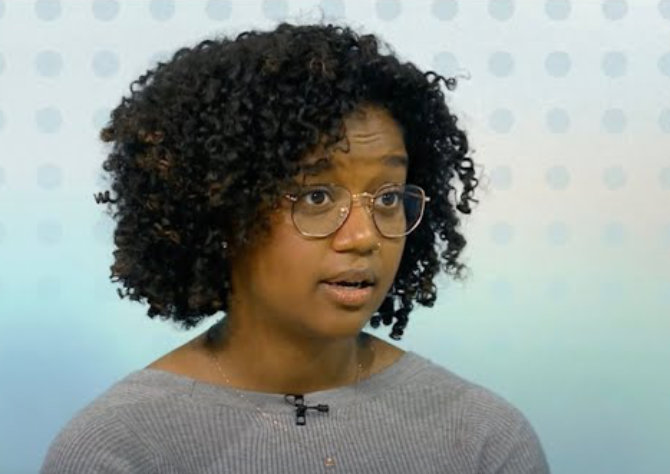
Shayna Lewis. (Supplied)
“It is absolutely beyond belief that the conference statement didn’t once mention what’s happening in Darfur right now.”
The omission of civilian protection from the final statement drew widespread concern.
“That silence isn’t just an oversight,” said Lewis. “It’s a devastating betrayal by those who could help but choose not to.”
Avaaz, a global advocacy organization, shared a stark summary: “There is a massive gap between the urgency on the ground and the pace of international action. While statements were read and funding was pledged, people were fleeing on foot, without food, without water, without help.”
Inside the camps, trauma is etched into every face.
“The psychological state of survivors is very bad,” said Dr. Mohammed. “Children and women are living without shelter. Some are still in shock. There are many injuries and we have almost no supplies left to treat them.”
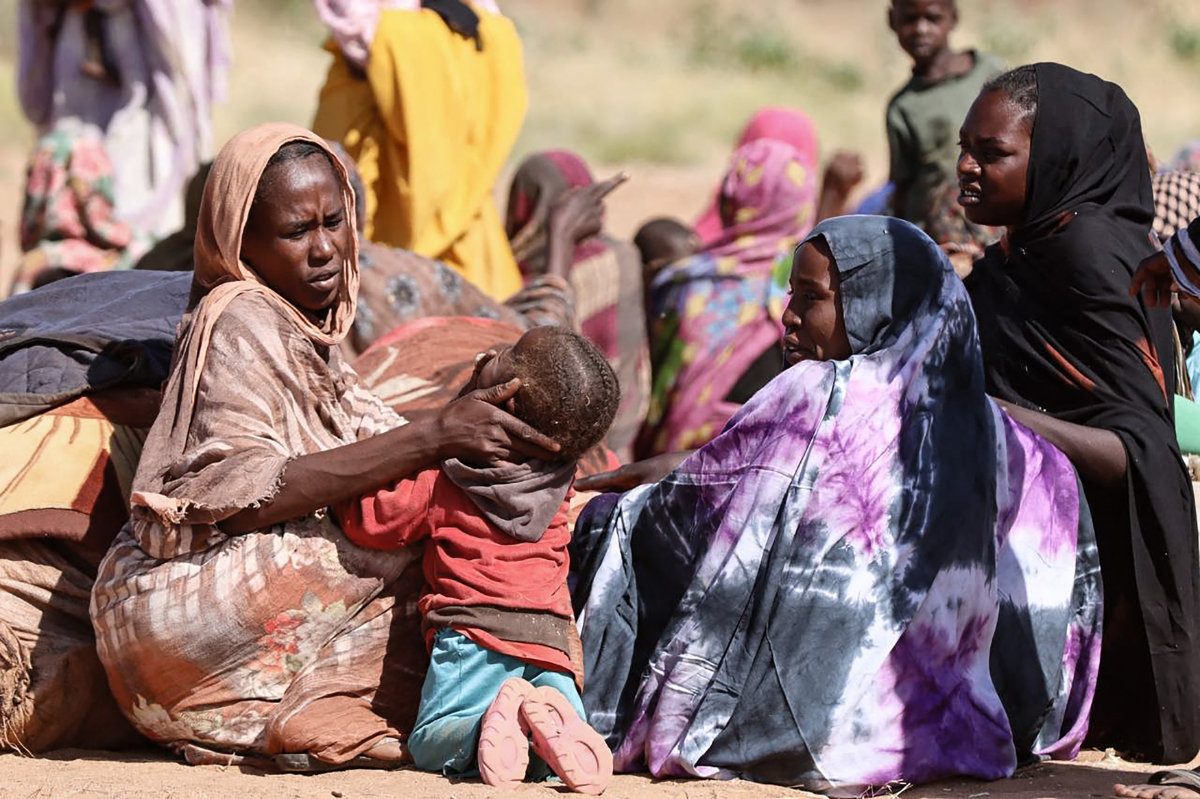
Displaced Sudanese women and children gather at a camp near the town of Tawila in North Darfur on February 11, 2025, amid the ongoing war between the army and paramilitary forces. (AFP)
Medical needs go unmet, food is scarce and temperatures are rising, with no reprieve in sight.
Relief organizations have warned that North Darfur is already at risk of famine. In a recent update, the UN’s World Food Programme estimated that more than 18 million people across Sudan face acute food insecurity, one of the world’s worst hunger crises.
As the rainy season approaches, access to many of the worst-affected areas might be further limited. Roads will wash away, disease will spread and the people who survived the shelling might face a slower, quieter death, from thirst, hunger or despair.
In the midst of such devastation, voices from Darfur are still calling out, pleading for assistance.
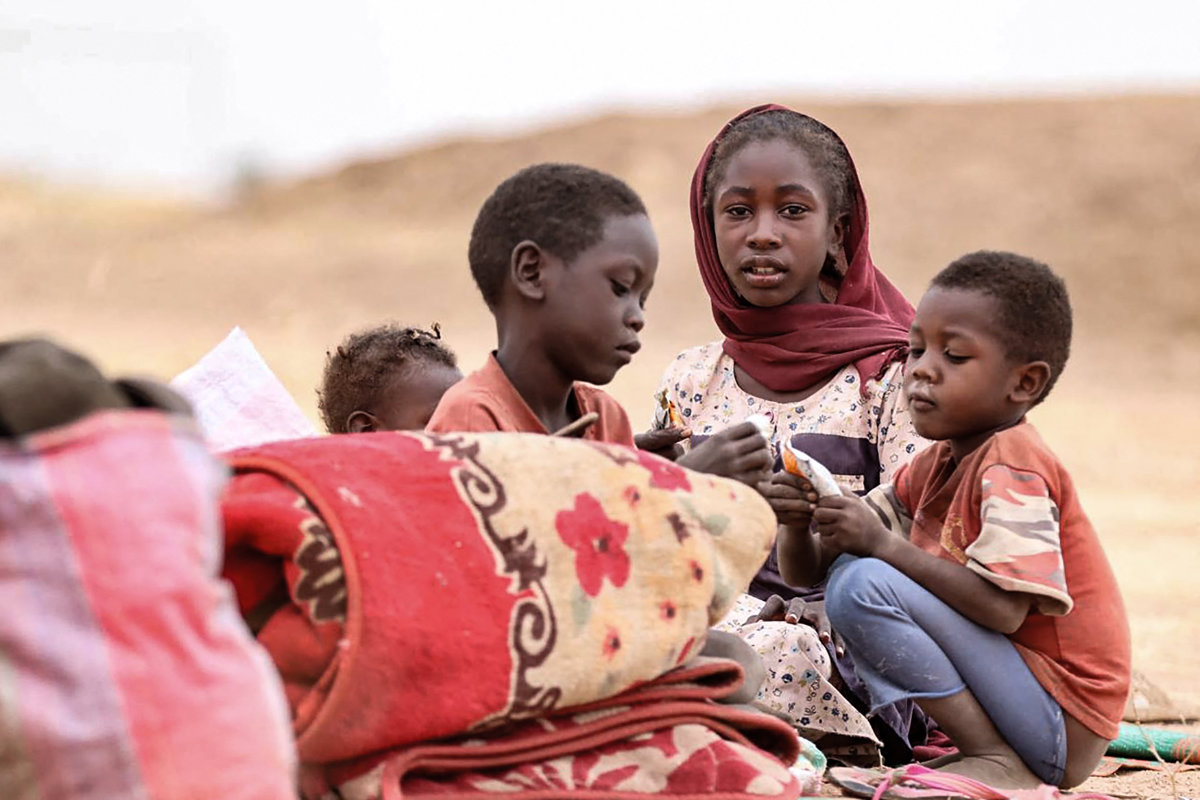
Displaced Sudanese children gather at a camp near the town of Tawila in North Darfur on February 11, 2025, amid the ongoing war between the army and paramilitary forces. (AFP)
“Help us,” said Dr. Mohammed. “Send water, food, medicine. Listen to us.”
Eva Khair, director of the Sudan Transnational Consortium, echoed the urgency of this plea.
“The message we are hearing from inside Sudan is clear,” she said. “People want to survive. They want dignity. But they cannot do this alone.”
Kate Ferguson, of the organization Protection Approaches, described this moment as one of grave responsibility for the international community.

People who fled the Zamzam camp for the internally displaced after it fell under RSF control, rest in a makeshift encampment in an open field near the town of Tawila in war-torn Sudan's western Darfur region on April 13, 2025. (AFP)
“The risk now is that this failure becomes precedent, that inaction becomes the norm,” she said. “But it doesn’t have to. There is still time to act. There is still a chance to protect life.”
As night falls over Tawila, the sands grow cool and the stars shine down on families who have not eaten in days. Some of them will sleep. Some will keep walking. Some will stay where they are, hoping for a relief truck, a food parcel, a medic — anything.
They have escaped one form of violence. Now they face another: indifference.




























